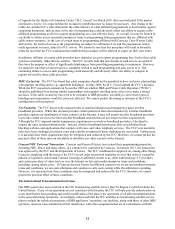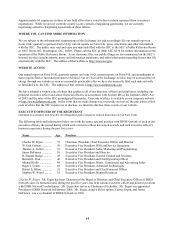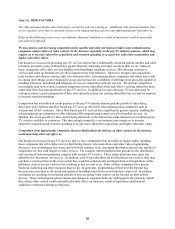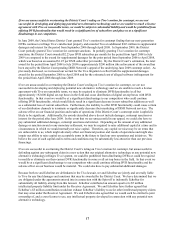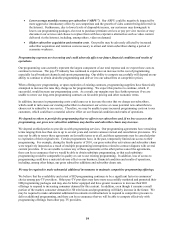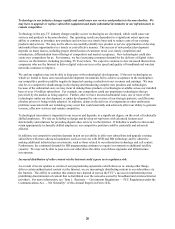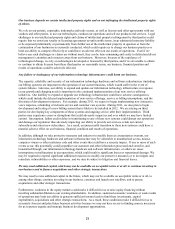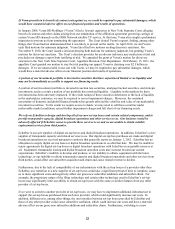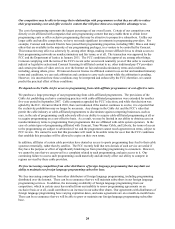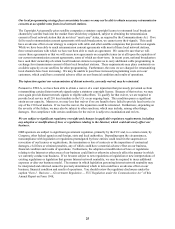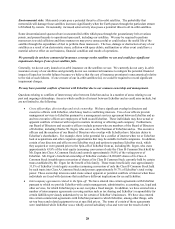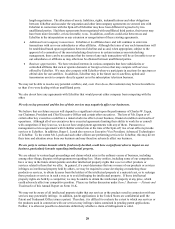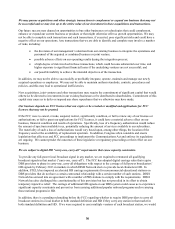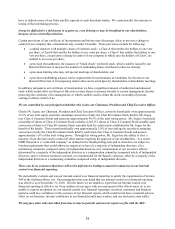Dish Network 2010 Annual Report Download - page 29
Download and view the complete annual report
Please find page 29 of the 2010 Dish Network annual report below. You can navigate through the pages in the report by either clicking on the pages listed below, or by using the keyword search tool below to find specific information within the annual report.
22
22
If Voom prevails in its breach of contract suit against us, we could be required to pay substantial damages, which
would have a material adverse affect on our financial position and results of operations.
In January 2008, Voom HD Holdings (“Voom”) filed a lawsuit against us in New York Supreme Court, alleging
breach of contract and other claims arising from our termination of the affiliation agreement governing carriage of
certain Voom HD channels on the DISH Network satellite TV service. At that time, Voom also sought a preliminary
injunction to prevent us from terminating the agreement. The Court denied Voom's request, finding, among other
things, that Voom had not demonstrated that it was likely to prevail on the merits. In April 2010, we and Voom
each filed motions for summary judgment. Voom later filed two motions seeking discovery sanctions. On
November 9, 2010, the Court issued a decision denying both motions for summary judgment, but granting Voom’s
motions for discovery sanctions. The Court’s decision provides for an adverse inference jury instruction at trial and
precludes our damages expert from testifying at trial. We appealed the grant of Voom's motion for discovery
sanctions to the New York State Supreme Court, Appellate Division, First Department. On February 15, 2011, the
appellate Court granted our motion to stay the trial pending our appeal. Voom is claiming over $2.5 billion in
damages. If we are unsuccessful in our suit with Voom, we may be required to pay substantial damages, which
would have a material adverse affect on our financial position and results of operations.
A portion of our investment portfolio is invested in securities that have experienced limited or no liquidity and
may not be immediately accessible to support our financing needs.
A portion of our investment portfolio is invested in auction rate securities, mortgage backed securities, and strategic
investments, and as a result a portion of our portfolio has restricted liquidity. Liquidity in the markets for these
investments has been adversely impacted. If the credit ratings of these securities deteriorate or the lack of liquidity
in the marketplace continues, we may be required to record impairment charges. Moreover, the sustained
uncertainty of domestic and global financial markets has greatly affected the volatility and value of our marketable
investment securities. To the extent we require access to funds, we may need to sell these securities under
unfavorable market conditions, record further impairment charges and fall short of our financing needs.
We rely on EchoStar to design and develop all of our new set-top boxes and certain related components, and to
provide transponder capacity, digital broadcast operations and other services to us. Our business would be
adversely affected if EchoStar ceases to provide these services to us and we are unable to obtain suitable
replacement services from third parties.
EchoStar is our sole supplier of digital set-top boxes and digital broadcast operations. In addition, EchoStar is a key
supplier of transponder capacity and related services to us. Our digital set-top box purchases are made and digital
broadcast operations are received pursuant to contracts that generally expire on January 1, 2012. EchoStar has no
obligation to supply digital set-top boxes or digital broadcast operations to us after that date. We may be unable to
renew agreements for digital set-top boxes or digital broadcast operations with EchoStar on acceptable terms or at
all. Equipment, transponder leasing and digital broadcast operation costs may increase beyond our current
expectations. EchoStar’s inability to develop and produce, or our inability to obtain, equipment with the latest
technology, or our inability to obtain transponder capacity and digital broadcast operations and other services from
third parties, could affect our subscriber acquisition and churn and cause related revenue to decline.
Furthermore, due to the lack of compatibility of our infrastructure with the set-top boxes of a provider other than
EchoStar, any transition to a new supplier of set-top boxes could take a significant period of time to complete, cause
us to incur significant costs and negatively affect our gross new subscriber additions and subscriber churn. For
example, the proprietary nature of the Sling technology and certain other technology used in EchoStar’s set-top
boxes may significantly limit our ability to obtain set-top boxes with the same or similar features from any other
provider of set-top boxes.
If we were to switch to another provider of set-top boxes, we may have to implement additional infrastructure to
support the set-top boxes purchased from such new provider, which could significantly increase our costs. In
addition, differences in, among other things, the user interface between set-top boxes provided by EchoStar and
those of any other provider could cause subscriber confusion, which could increase our costs and have a material
adverse effect on our gross new subscriber additions and subscriber churn. Furthermore, switching to a new


